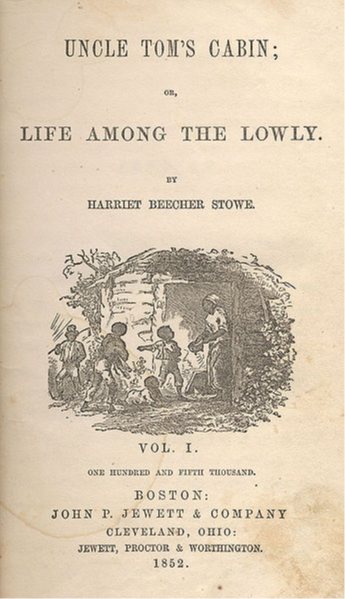Uncle Tom's Cabin کلبه عمو تام اثر جاویدان هریت بیچر استو

کلبه عمو تام (به انگلیسی: Uncle Tom's Cabin) کتابی است با موضوع ضد بردهداری نوشتهٔ هریت بیچر استو نویسنده آمریکایی.
کتاب در سال ۱۸۵۲ منتشر شد و تأثیر زیادی بر جنگ داخلی آمریکا، موضوع آمریکاییهای آفریقاییتبار و بردهداری در آمریکا گذاشت.[۱] این کتاب پرفروشترین کتاب داستان در قرن نوزدهم و دومین کتاب پرفروش بعد از انجیل (با کمک قانون لغو برده داری) بود و در چاپ اول ۳۰۰ هزار عدد از آن فقط در آمریکا فروش رفت.
کلبه عمو تام درابتدا به صورت پاورقی در یکی از روزنامهها چاپ شد و وقتی به صورت کتاب چاپ شد نه تنها در آمریکا بلکه در تمام کشورهای جهان نیز میلیونها نسخه از آن به فروش رفت و تا سالها نمایشهایی بر اساس آن بر صحنه تئاترهای جهان اجرا شد. دیری نگذشت که در آمریکا خانم استو از یک سو به شخصیتی بسیار محبوب و از سوی دیگر به چهرهای بسیار منفور مبدل شد. حتی در گرماگرم جنگ داخلی آمریکا آبراهام لینکلن رئیس جمهور وقت آمریکا در ملاقاتی به او گفت: «پس شما همان خانم کوچکی هستید که باعث جنگی بزرگ (جنگ داخلی آمریکا) شد». به دلیل اینکه جنگ داخلی ۹ سال بعد از انتشار کتاب آغاز شد عدهای انتشار این رمان را جنجالیترین حادثه در تاریخ رماننویسی میدانند.
تولستوی پس از خواندن این کتاب در ستایش آن گفت: «این رمان یکی از بزرگترین فراوردههای ذهن بشر است.»
دانلود نسخه پارسی کتاب کلبه عمو تام
Uncle Tom's Cabin; or, Life Among the Lowly,[1][2] is an anti-slavery novel by American author Harriet Beecher Stowe. Published in 1852, the novel had a profound effect on attitudes toward African Americans and slavery in the U.S. and is said to have "helped lay the groundwork for the Civil War".[3]
Stowe, a Connecticut-born teacher at the Hartford Female Seminary and an active abolitionist, featured the character of Uncle Tom, a long-suffering black slave around whom the stories of other characters revolve. The sentimental novel depicts the reality of slavery while also asserting that Christian love can overcome something as destructive as enslavement of fellow human beings.[4][5][6]
Uncle Tom's Cabin was the best-selling novel of the 19th century and the second best-selling book of that century, following the Bible.[7][8] It is credited with helping fuel the abolitionist cause in the 1850s.[9]
In the first year after it was published, 300,000 copies of the book
were sold in the United States; one million copies in Great Britain.[10] In 1855, three years after it was published, it was called "the most popular novel of our day."[11] The impact attributed to the book is great, reinforced by a story that when Abraham Lincoln met Stowe at the start of the Civil War, Lincoln declared, "So this is the little lady who started this great war."[12] The quote is
apocryphal;
it did not appear in print until 1896, and it has been argued that "The
long-term durability of Lincoln's greeting as an anecdote in literary
studies and Stowe scholarship can perhaps be explained in part by the
desire among many contemporary intellectuals ... to affirm the role of
literature as an agent of social change."[13]
The book and the plays it inspired helped popularize a number of stereotypes about black people.[14] These include the affectionate, dark-skinned "mammy"; the "pickaninny" stereotype of black children; and the "Uncle Tom", or dutiful, long-suffering servant faithful to his white master or mistress. In recent years, the negative
associations with Uncle Tom's Cabin have, to an extent, overshadowed the historical impact of the book as a "vital antislavery tool."[15]
